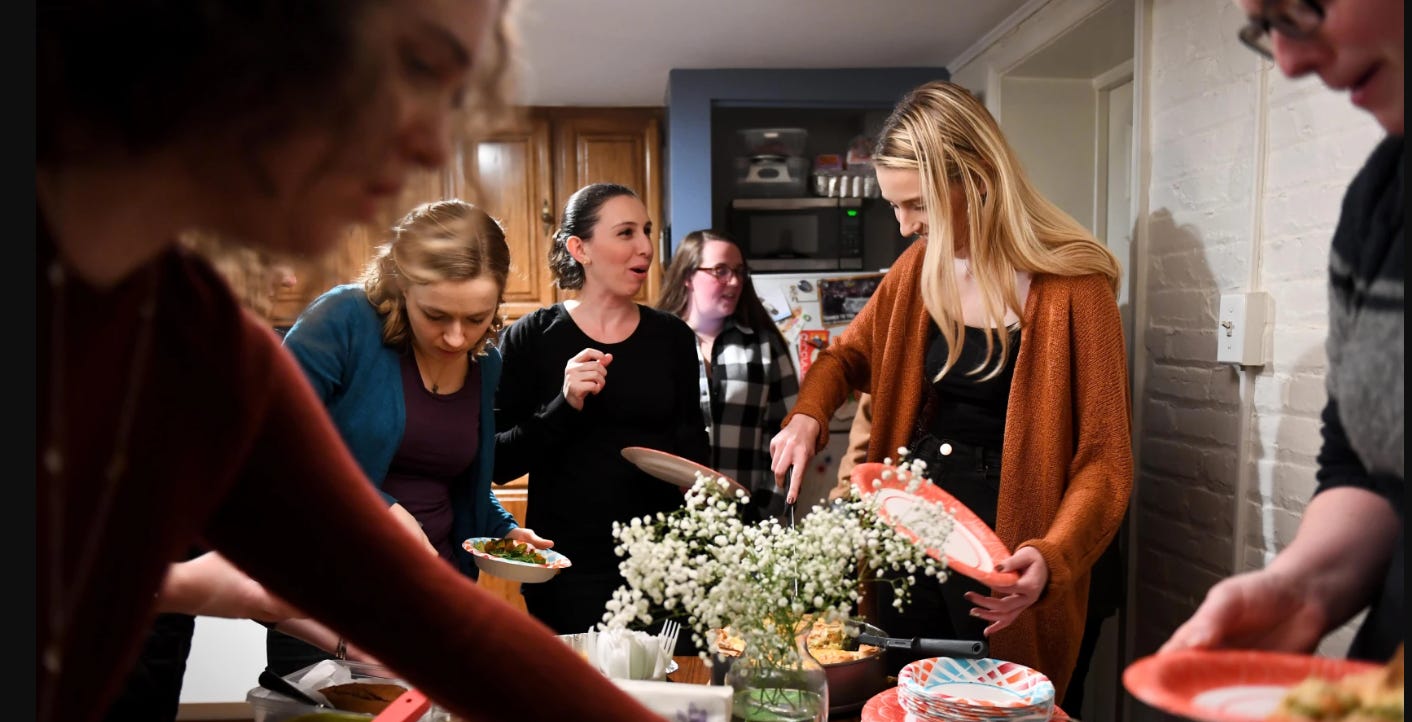Getting spiritual
The church in America’s 21st century social architecture, a Pew study on spirituality, and helping the non-religious find meaning
Good morning,
We’re starting 2024 on a ~spiritual~ foot. Consider this newsletter the pre-meal grace before an all you can eat buffet of reads for the year. Our features this week wrestle with some of the biggest open questions related to religion, spirituality, and community:
What role should the church play in America’s 21st century social architecture?
How do religious and spiritual but not religious Americans differ in their relationship to self and community?
How are civil society groups helping the growing number of non-religious Americans find meaning in their lives?
Let us know what you think. If you’re religious, where have you seen your house of worship show up in your community and where have you seen it fall short? If you’re spiritual but not religious, where have you turned to find meaning and spiritual care in your life?
A small aside before we close: we’ll be reaching out to some of you individually in the next week for feedback on what’s working, what you’d like to see more of, and what we can do differently. We’re excited to hear from you :) In the meantime, thanks as always for reading.
- Sam, Eric, + David
The Reads
Comment Magazine - “Church, where are you?” by Anne Snyder
What is the role of the church in America’s 21st century social architecture? Speaking to a largely Christian audience, Snyder writes with exasperation about the transformative, restorative potential of the church to remedy our societal and individual ills—and its continual failure to meet the moment. To Snyder, the average congregation has “ceded the floor” in providing “a home that is trustworthy enough, believable enough, vibrant and countercultural enough, [for us] to lay down our defences, to be our full selves, and to submit.” At a moment when Americans need solidarity in the face of disconnection, grounding in the face of upheaval, and commitment in the face of optionality, the church is missing in action. Snyder concludes by encouraging the reader to ask: “Church, where are you?”
The Research
Pew Research Center - “Spirituality Among Americans” by Becka Alper (Dec. 2023)
With approximately 30 percent of Americans identifying as religious “nones” (an all-time high), Pew conducted its first-ever study on Americans’ spiritual beliefs, practices, and experiences. They find that, while Americans are identifying with and participating in religion less, they are still highly spiritual. Here are some of the topline findings from the research:
Approximately 70 percent of U.S. adults can be considered “spiritual” in some way, including 83 percent who believe “people have a soul or spirit in addition to their physical body” and 81 percent who say “there is something spiritual beyond the natural world, even if we cannot see it.”
Americans are still far more likely to gather in religious communities than in non-religious spiritual communities. Fully 39 percent of U.S. adults say they are involved in a religious community, while 14 percent say they are involved in “a spiritual community, such as a group that helps [them] find a connection with something bigger than [themselves], nature or other people.”
Fully 22 percent of U.S. adults are spiritual but not religious. These adults hold many of the beliefs and practices that would be considered “spiritual,” but don’t consider themselves religious or see religion as important to their lives. Interestingly, this group spends more time than religious and spiritual adults on more individualistic, inward-focused activities (e.g., meditation, journaling) and less time in communal, outward-focused activities (e.g., worship, service). While organized religion calls us to look beyond ourselves, contemporary spirituality appears to push us more inward.
→ read the research summary here and full report here.
The Work
The Chronicle of Philanthropy - “Nonprofits help the nonreligious search for meaning in their lives” by Emily Haynes (Dec. 2023)
Americans may be turning away from organized religion at a rapid rate, but many still yearn for the sense of connection and meaning that religious participation offers. Enter a new set of nonprofits—The Dinner Party, Middle Circle, Spiritual Care Services of Maine—all of which are attempting to fill part of the spiritual void in the lives of the religious “nones.” It remains to be seen whether groups like these can offer a true replacement for organized religion. What this article underscores, however, is our enduring need as humans for spiritual care and community—regardless of whether or not we’re religious.
… and if you’re interested in reading more on this topic, we commend “American Religion is Not Dead Yet,” which was published in The Atlantic early last year.







